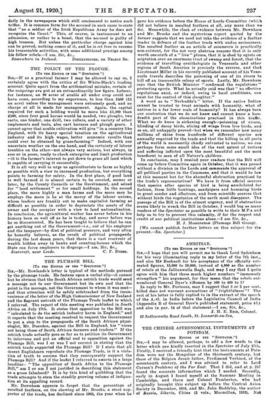THE POLICY OF THE PLOUGH.
(To TUE EDITOR or THE " SPECTATOR.")
SIR,—If as a practical farmer I may be allowed to say so, I certainly agree with the critics of Sir White-Black's trading account. Quite apart from the arithmetical mistake, certain of the outgoings are put at an extraordinarily low figure. Labour, for instance, on 90 acres of arable all under crop could not have come, according to my experience, to less than £450 (t5 an acre) unless the management were extremely good, and no charge at all is made for management. Again, the capital required for such a holding would be more like £1,200 than £500, since four good horses would be needed, two ploughs, two carts, one binder, one drill, two rollers, and a variety of other implements and tools, also cart harness and plough gears. I cannot agree that arable cultivation will give "in a country like England, with its heavy special taxation on the agricultural industry and its high wages, better economic results than could ever be obtained by grass-farming." Indeed, with our uncertain weather on the one hand, and the certainty of labour troubles on the other—not always very serious, but always, in esse or in posse, ready to check enterprise and limit production —it is the farmer's interest to put down to grass all land which is capable of carrying it successfully.
It is all very well to urge us agriculturists to farm as highly as possible with a view to increased production, but everything points to farming for safety. In the first place, if good land is well farmed it is almost certain to be coveted, sooner or later, by the County Councils or the Government, and seized for " land settlement " or for small holdings. In the second place, the more highly a man farms and the more men he employs the more is he at the mercy of the labour unions, whose leaders are frankly out to make capitalist farming as difficult as possible in order to depreciate the assets of the owner and the occupier with a view to land nationalization. In conclusion, the agricultural worker has never before in his history been so well off as he is to-day, and never before was he so discontented. He has been taught to believe that he can get anything out of the Government—i.e., out of his employer and the taxpayer—by dint of political pressure, and very often he honestly believes, as the result of political propaganda during the last dozen years, that there is a vast reservoir of wealth hidden away in banks and counting-houses which the State can force employers to disgorge.—I am, Sir, &c.,


































 Previous page
Previous page